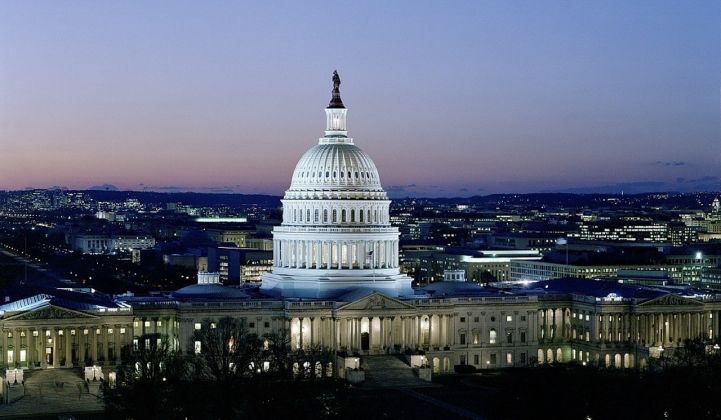The public health crisis of COVID-19 has brought much of the U.S. economy to a halt. While the most visible impacts have been in hotels and restaurants, the advanced energy industry has been hit hard as well.
Specific relief that’s needed now can sustain the industry through the crisis and ensure that it is ready to drive economic recovery when the crisis has passed. Best of all, this relief will cost U.S. taxpayers nothing today — and if done right, it will boost U.S. manufacturing tomorrow.
What is this simple, no-cost solution? Allowing direct payment instead of federal tax credits for advanced energy development. It could be done temporarily, for all projects, to keep the industry going through the crisis. If done on a permanent basis for projects using substantial domestic content it would provide a strong incentive for U.S. manufacturing of advanced energy products.
Under current law, installations of solar, wind, battery storage, fuel cells and other advanced energy technologies receive support in the form of federal tax credits, which are used to finance development. Even in good times, access to tax equity is constrained, as the market is controlled by just a few large banks, which take a 13 percent share of the proceeds. But now, with the economy virtually frozen, the tax equity market has all but dried up. Only the most well-capitalized developers can access tax equity financing today, and even that may not last for long.
There’s no reason that federal support for advanced energy development has to be funneled through the tax equity market. Allowing direct payment costs the federal government nothing more than existing tax credits already do. The outlay from the budget simply replaces forgone tax revenue. And it could be done easily, by making the value of tax credits refundable: For a company with tax liability, it would reduce taxes owed; if it has no tax liability or if taxes owed are less than the credit, payment would come in the form of a refund.
Here’s why this is needed: More than 100,000 advanced energy workers lost their jobs in March alone. Adding temporary furloughs and under-employment brings the total to nearly 400,000. Job losses will exceed 500,000 before long unless the industry receives support.
The job losses span the broad advanced energy spectrum. Renewable energy projects have stalled. Utility-sponsored energy efficiency programs have been suspended, as providers are unable to access homes or businesses. Manufacturing of electric vehicles has come to a stop.
As a result, our member companies report severe impacts: A majority of firms have stopped hiring or reduced their workforces; 84 percent of businesses say they have had projects stopped, delayed or canceled. Nearly two-thirds of companies say federal relief measures have provided no help. Almost half of businesses report revenue 25 to 50 percent below projections.
What happens to the advanced energy industry matters because it is an engine of growth. Advanced energy is a $238 billion industry in the U.S., and it has been growing faster than the overall economy for many years. Advanced energy employed 3.6 million Americans in 2019, with employment growth nearly double that of overall U.S. job growth. What’s more, advanced energy employers projected 5 percent job growth in 2020 — before the coronavirus pandemic hit. Now, all of last year’s advanced energy job growth has been wiped out, and then some.
But advanced energy can be a source of economic and job growth once again. As the lowest-cost means to meet energy needs today, advanced energy resources put money in the pocket of every American. That makes this the right time to chart a course to 100 percent clean electricity, as 14 states and Washington, D.C. have already done, along with utilities including Arizona Public Service, Duke Energy and Xcel Energy. With smart policies, a clean energy future can rebuild our U.S. manufacturing base, at a time when COVID-19 supply-chain disruptions acutely remind us that domestic production is essential.
Direct pay will not relieve all the COVID-19 disruption on advanced energy businesses. But it will immediately reduce uncertainty, increase liquidity and ensure a speedy recovery for advanced energy developers at a crucial time. In a recent survey of our member companies, 60 percent said that a change of federal tax credits to 100 percent direct pay would help their businesses.
This change should be made on a temporary basis, to save jobs today and keep the industry working. But making direct pay permanent for projects using U.S. content would be a game-changer. It would give U.S. manufacturers a leg up in a growing market and provide a strong incentive for investment in U.S. manufacturing.
Preserving jobs today. Creating U.S. manufacturing jobs tomorrow. Saving money for consumers. Making America a global leader in clean energy. That’s what this smart, no-cost change in federal rules would accomplish. Congress should do it now.
***
Nat Kreamer is CEO of the Advanced Energy Economy industry group, former board chair of the Solar Energy Industries Association and co-founder of Sunrun, the nation’s largest residential solar company.




